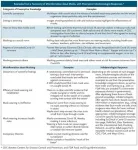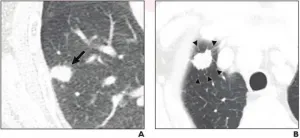(Press-News.org) The chemical compound glyphosate, the world's most widely used herbicide, can weaken the immune systems of insects, suggests a study from researchers at the Johns Hopkins Bloomberg School of Public Health. Glyphosate is the active ingredient in Round Up™, a popular U.S. brand of weed killer products.
The researchers investigated the effects of glyphosate on two evolutionarily distant insects, Galleria mellonella, the greater wax moth, and Anopheles gambiae, a mosquito that is an important transmitter of malaria to humans in Africa. They found that glyphosate inhibits the production of melanin, which insects often use as part of their immune defenses against bacteria and parasites; it thereby reduces the resistance of these species to infection by common pathogens.
The findings were published online May 12 in in PLoS Biology.
"The finding that glyphosate appears to have an adverse effect on insects by interfering with their melanin production suggests the potential for a large-scale ecological impact, including impacts on human health," says study co-first author Daniel Smith, a PhD candidate in the laboratory of Arturo Casadevall MD, PhD, Alfred and Jill Sommer Professor and Chair of the Department of Molecular Microbiology and Immunology at the Bloomberg School.
The study was a collaboration between the laboratories of Casadevall and Nichole Broderick, PhD, assistant professor in the Department of Biology at Johns Hopkins University.
"Our results show unexpected effects from a widely used herbicide, and alert us to the fact that spreading these chemicals in the environment may have unintended consequences," says Casadevall, a Bloomberg Distinguished Professor.
The idea that human products and activities can inadvertently disrupt surrounding animal populations through the use of ordinary household or industrial chemicals is by now widely accepted. About 50 years ago, for example, most countries banned the common pesticide DDT due to its deleterious effects on insects, fish, and birds. In recent years, apparent declines in some insect populations have led to concerns among scientists that other common chemicals, including glyphosate, may also be causing harmful disruptions to ecosystems.
Prior research suggests that glyphosate may have adverse effects on honeybees and other insect species, linking the effect to oxidation or disrupting gut bacteria, but scientists haven't investigated additional adverse effects that could occur. In 2001, Casadevall and colleagues found that glyphosate can weaken fungi by inhibiting their production of melanin, a compound that helps pathogenic fungi resist the immune systems of animals they infect.
Melanin has many other functions in the animal kingdom. While in humans it is best known as a light-absorbing pigment that protects the skin from ultraviolet radiation damage, melanin plays an important role in immunity in insects. Thus, in the new study, the researchers examined glyphosate's effects on melanin production and immunity in two representative insect species, the greater wax moth and an African mosquito that can carry malaria.
Melanin works in insect immunity essentially by trapping and killing an invading bacterium, fungal cell, or parasite. Melanin production rises in response to the infection, and in a process called melanization, melanin molecules surround the invading pathogen--while highly reactive molecules produced as part of the melanin-synthesis process, effectively destroy the invader. Smith and colleagues found that in the larvae of Galleria mellonella moths, glyphosate inhibits the complex set of reactions that synthesize melanin, and thus weakens the melanization response and shortens the survival of the insects when they are infected with the yeast Cryptococcus neoformans.
Similarly, the researchers found that in A. gambiae mosquitoes, glyphosate inhibits melanin production and melanization, and thereby makes the mosquitoes more susceptible to infection by Plasmodium falciparum, the most dangerous species of malaria parasite. They found too that glyphosate alters the composition of the bacterial and fungal population in the mosquito midgut--the "gut microbiome" that, as in humans, helps regulate mosquito health.
In a further set of experiments, Smith and colleagues found that other phosphate-containing compounds related to glyphosate have similar effects in reducing melanization.
To the researchers, the results raise concerns that glyphosate and possibly other phosphate-containing compounds may be harming insect populations. Insects have many roles in the global ecosystem, and disrupting their populations could in turn have major adverse effects on people, for example in agriculture, and even in the realm of infectious diseases.
"Mosquitoes exposed to glyphosate were less able to control Plasmodium infections they would have otherwise resisted, which hints that glyphosate exposure may make them better vectors for malaria," Smith says. "These results raise concerns about the increasing use of glyphosate in regions of the world where malaria is endemic."
The researchers are now studying the long-term, multi-generational effects of glyphosate on insect populations.
INFORMATION:
"Glyphosate Inhibits Melanization and Increases Susceptibility to Infection in Insects" was authored by co-first authors Daniel Smith, Emma Camacho, Raviraj Thakur, and Alexander Barron, and by Yuemei Dong, George Dimopoulos, Nichole Broderick, and Arturo Casadevall.
The research was supported by the Johns Hopkins Malaria Research Institute, the National Institutes of Health (5T32GM008752-18, 1T32AI138953-01A1, and R35GM128871), and the National Institutes of Allergy and Infectious Disease (R01AI052733).
People who work nontraditional work hours, such as 11 p.m.-7 p.m., or the "graveyard" shift, are more likely than people with traditional daytime work schedules to develop a chronic medical condition -- shift work sleep disorder -- that disrupts their sleep. According to researchers at the University of Missouri, people who develop this condition are also three times more likely to be involved in a vehicle accident.
"This discovery has many major implications, including the need to identify engineering counter-measures to help prevent these crashes from happening," said Praveen Edara, department chair and professor of civil and environmental ...
Writing in the New England Journal of Medicine, a trio of science communication researchers proposes to treat the Covid-19 misinformation "infodemic" with the same methods used to halt epidemics.
"We believe the intertwining spreads of the virus and of misinformation and disinformation require an approach to counteracting deceptions and misconceptions that parallels epidemiologic models by focusing on three elements: real-time surveillance, accurate diagnosis, and rapid response," the authors write in a Perspective article.
"The word 'communicable' comes from the Latin communicare, ...
New research led by the University of Kent has found that people fail to recognise the role of factory farming in causing infectious diseases.
The study published by Appetite demonstrates that people blame wild animal trade or lack of government preparation for epidemic outbreaks as opposed to animal agriculture and global meat consumption.
Scientists forewarned about the imminence of global pandemics such as Covid-19, but humankind failed to circumvent its arrival. They had been warning for decades about the risks of intensive farming practices for public health. The scale of production and overcrowded conditions on factory farms make it easy for viruses to migrate and spread. Furthermore, ...
HOUSTON - Cytokine-activated natural killer (NK) cells derived from donated umbilical cord blood, combined with an investigational bispecific antibody targeting CD16a and CD30 known as AFM13, displayed potent anti-tumor activity against CD30+ lymphoma cells, according to a new preclinical study from researchers at The University of Texas MD Anderson Cancer Center.
The findings were published today in Clinical Cancer Research, a journal of the American Association for Cancer Research. These results led to the launch of a Phase I clinical trial to evaluate the combination of cord blood-derived NK cells (cbNK cells) with AFM13 as an experimental cell-based immunotherapy in patients with CD30+ lymphoma.
"Developing novel NK cell therapies has been a priority for my ...
WASHINGTON -- In a new study, researchers have shown that 3D printing can be used to make highly precise and complex miniature lenses with sizes of just a few microns. The microlenses can be used to correct color distortion during imaging, enabling small and lightweight cameras that can be designed for a variety of applications.
"The ability to 3D print complex micro-optics means that they can be fabricated directly onto many different surfaces such as the CCD or CMOS chips used in digital cameras," said Michael Schmid, a member of the research team from University of Stuttgart in Germany. "The micro-optics can ...
CORVALLIS, Ore. - Free from human disturbance for a century, an inland island in Central America has nevertheless lost more than 25% of its native bird species since its creation as part of the Panama Canal's construction, and scientists say the losses continue.
The Barro Colorado Island extirpations show how forest fragmentation can reduce biodiversity when patches of remnant habitat lack connectivity, according to a study by researchers at Oregon State University.
Even when large remnants of forest are protected, some species still fail to survive because of subtle ...
DALLAS - May 12, 2021 - Scientists with UT Southwestern's Peter O'Donnell Jr. Brain Institute have identified the molecular mechanism that can cause weight gain for those using a common antipsychotic medication. The findings, published in the Journal of Experimental Medicine, suggest new ways to counteract the weight gain, including a drug recently approved to treat genetic obesity, according to the study, which involved collaborations with scientists at UT Dallas and the Korea Advanced Institute of Science and Technology.
"If this effect can be shown in clinical trials, it could give us a way to effectively treat ...
Astronomers commonly refer to massive stars as the chemical factories of the Universe. They generally end their lives in spectacular supernovae, events that forge many of the elements on the periodic table. How elemental nuclei mix within these enormous stars has a major impact on our understanding of their evolution prior to their explosion. It also represents the largest uncertainty for scientists studying their structure and evolution.
A team of astronomers led by May Gade Pedersen, a postdoctoral scholar at UC Santa Barbara's Kavli Institute for Theoretical Physics, have now measured the internal mixing within an ensemble of these stars using observations ...
Leesburg, VA, May 13, 2021--According to an open-access Editor's Choice article in ARRS' American Journal of Roentgenology (AJR), CT features may help identify which patients with stage IA non-small cell lung cancer are optimal candidates for sublobar resection, rather than more extensive surgery.
This retrospective study included 904 patients (453 men, 451 women; mean age, 62 years) who underwent lobectomy (n=574) or sublobar resection (n=330) for stage IA non-small cell lung cancer. Two thoracic radiologists independently evaluated findings on preoperative chest CT, later resolving any discrepancies. Recurrences were identified via medical record review.
"In patients with stage IA non-small cell lung cancer, pathologic ...
Boston - Pregnant women with symptomatic COVID-19 have a higher risk of intensive care unit admissions, mechanical ventilation and death compared to non-pregnant reproductive age women. Increases in preterm birth and still birth have also been observed in pregnancies complicated by the viral infection. The Centers for Disease Control and Prevention (CDC) recommended that people who are pregnant may choose to be vaccinated at their own discretion with their healthcare provider. However, pregnant and lactating women were not included in Phase 3 vaccine efficacy trials; thus, data on vaccine safety and immunogenicity in this population is limited.
In a new study from Beth Israel Deaconess Medical Center (BIDMC), ...






